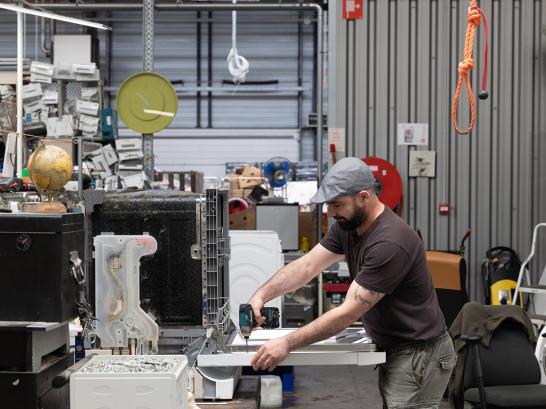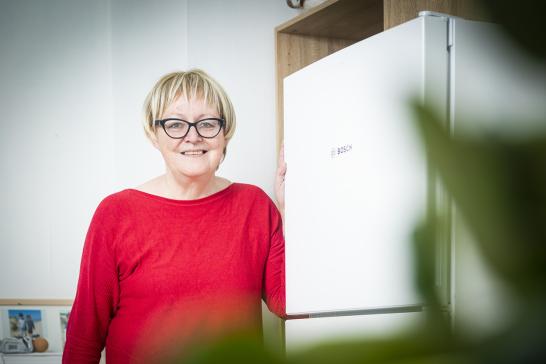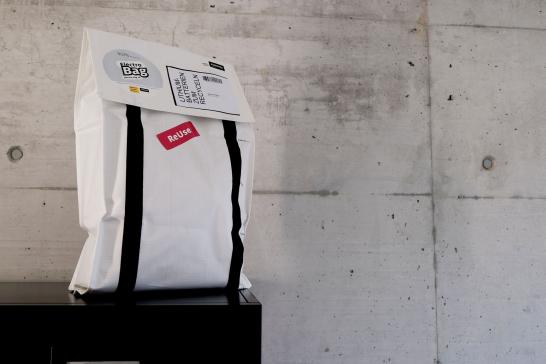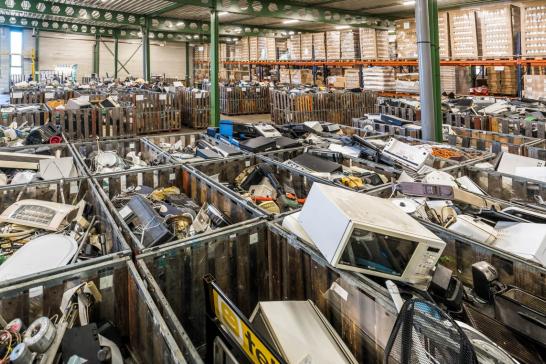

De Kringwinkel Hageland is the organisation behind four second-hand shops, or Kringwinkels: in Aarschot, Diest, Tienen, and Landen. But its activities are even broader than that, including ‘BENOvation coaches’ (beter renoveren, or renovate better), who help people improve the energy performance of their homes, an auction website, and its own collection channels for discarded electrical and electronic equipment. In order to maximise the reuse of these appliances, De Kringwinkel Hageland has its own repair service. This service checks the appliances and carries out repairs where necessary, so that people can buy second-hand electronics and electrical appliances with peace of mind and a one-year warranty.
“For just white goods alone, such as washing machines and refrigerators, we have a repair team of ten people,” says Paul Stessens, Director of De Kringwinkel Hageland. “This is part of our mission: to contribute to the circular economy by giving a second life to as many appliances as possible. At the same time, as a social enterprise company, we are also creating interesting jobs for disadvantaged groups. Think, for example, of non-native newcomers with an interest in mechanics. They can start with us in the repair department and, in time, advance in the field. Because of the shortages in the labour market, the big manufacturers are now coming to us, looking for good repairers.”
Training recognition software
In 2021, in cooperation with Recupel, the repair service of De Kringwinkel Hageland tested an app developed by the Faculty of Engineering at KU Leuven. The programme could automatically detect the exact model of a washing machine on the basis of a photo. In addition, the repairers could make notes about common defects, possible solutions and useful spare parts to be recovered from discarded devices for each model. “The software was developed to be self-learning,” explains Eric Boogerman, Team Leader at De Kringwinkel Hageland. “This means that the app needed many pictures of different washing machines as examples in order to be able to recognise the different models with increasing accuracy. Our repair team trained the programme by using it on a daily basis and correcting it when necessary.”
“At the same time, our repairers also kept track of which defects the devices had, and how they repaired them. By doing this, they filled an entire database with error analyses and all kinds of tips and advice. The next time the same model would come in, the app recognised it, and the repairer immediately knew where to look first to locate the possible defect. And even if the device was beyond repair, the app was often able to tell us which parts were recoverable for re-use. We could then recover those parts to use as spares before scrapping the appliance.”
Future potential
Meanwhile, the pilot project in cooperation with KU Leuven and Recupel has come to an end. However, Recupel has already commissioned a follow-up project. Stessens is happy about this: “One of the main reasons that old electrical appliances are not repaired today is because it is too expensive. By that I mean primarily that it is too labour-intensive. The combination of the recognition software and the database can save us a lot of time, especially if we were to integrate it into the computer system we now use to monitor the appliances. When a device comes in today, we individualise it with a barcode. We then record all the technical characteristics associated with the barcode, such as brand, model, motor type and power capacity, in our computer system. Recognition software can do all of this on the basis of a photograph and the entry of the most common defects. And since we see some models in our workshop up to three times a week, a system like this is not simply a luxury.”
More information about this project on dekringwinkel.be/hageland.



